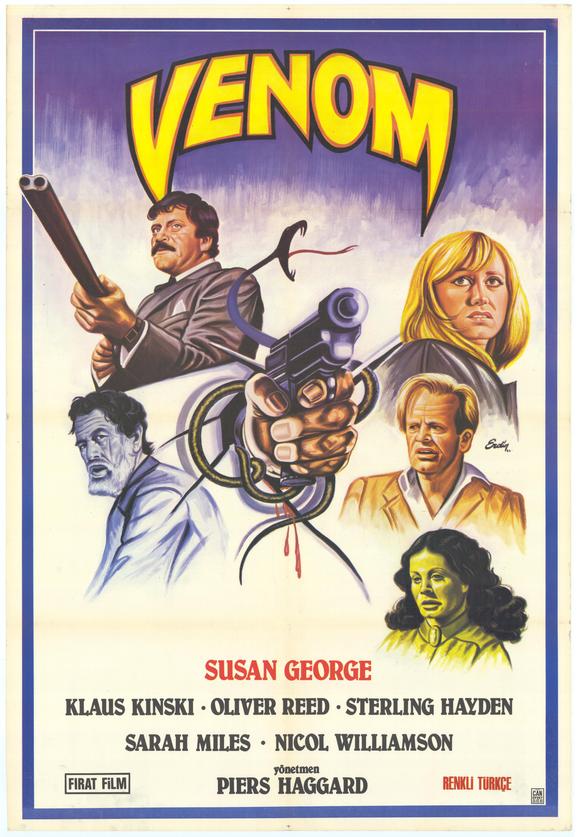
There are so many points in VENOM where the film could have fallen apart. Despite a small budget and two members of its ensemble cast who do not look to be operating at peak health, the film keeps expanding, raising the stakes (my apologies to all you screenwriters who are sick of hearing that phrase) every fifteen minutes or so, until the plot is so ludicrous, it needs a climax so far over-the-top that it doubles back and becomes sublime.
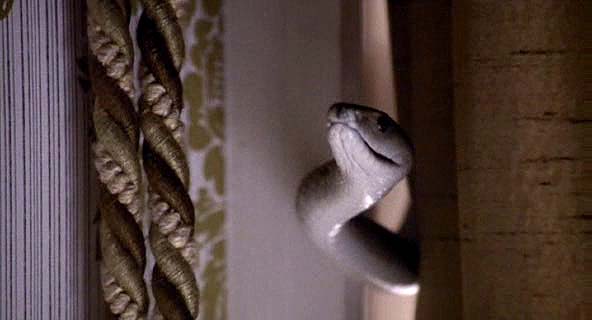
Perhaps best described as a hybrid of THE DESPERATE HOURS and DOG DAY AFTERNOON with a deadly snake popping up every now and then, VENOM is a trashy movie. But to the credit of its cast and crew, either no one received that memo, or they chose to ignore such news. The results of everyone taking things so seriously are a mixture of honest tension and occasionally campy moments that add up to a goofy thriller with some superficial attempts at being a highbrow production.
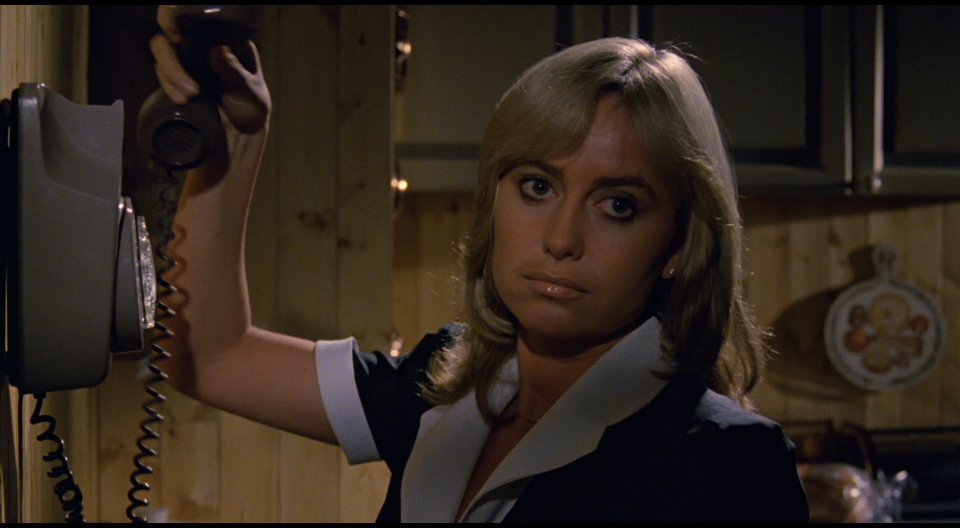
In London, Jacmel (Kinski), Dave (Oliver Reed), and Louise (Susan George), a trio of semi-bumbling criminals, conspires to kidnap Philip (Lance Holcomb), the severely asthmatic son of a wealthy American hotelier. Their plan is simple: while Philip’s over-protective mother (Cornelia Sharpe) is out of the country, they are to lure Philip’s grandfather (Sterling Hayden) out of the home, grab Philip, and take him to a safe house until the parents pony up the cash. Of course, things go as wrong as you can expect from a caper planned by actors best known for playing psychos, drunks, femme fatales, and all around screw ups.
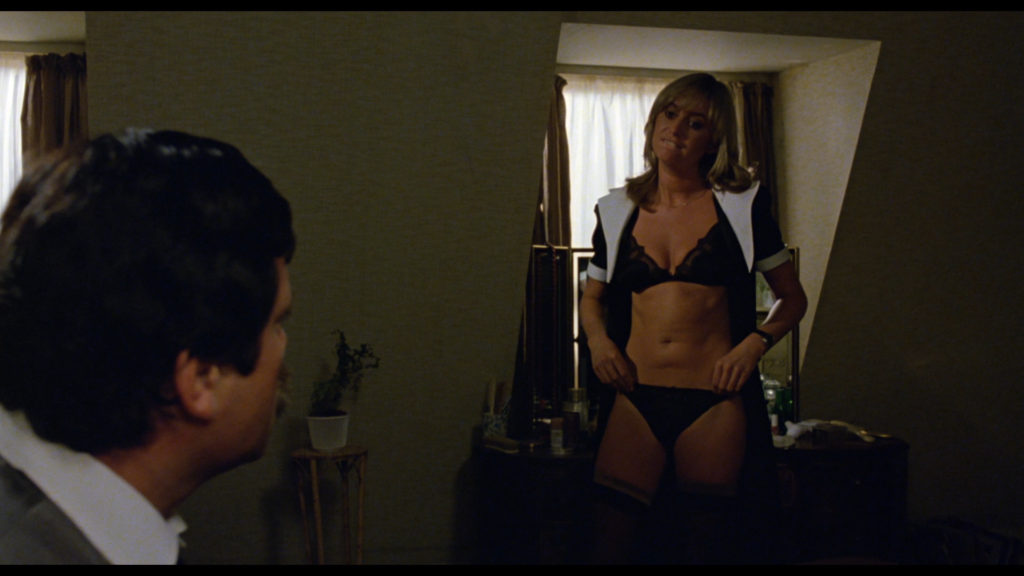
Not only does the grandfather come home too soon, interrupting the kidnapping, but—through a mix up at a pet store—Philip brings a black mamba home instead of the harmless pet snake he ordered. The black mamba is released into the house and an ill-fated police officer—tipped off to the possibility of the mamba’s presence by the toxicologist who actually ordered it—rings the doorbell, unaware that trigger-happy Dave is on the other side of the door with a shotgun.
The ensuing police siege of the house in an upscale neighborhood brings no-nonsense police commander Bulloch (Nicol Williamson) to the scene. As he negotiates with Jacmel to try and get Philip and his grandfather released, the criminals and hostages also have to fear the deadly snake loose in their midst.
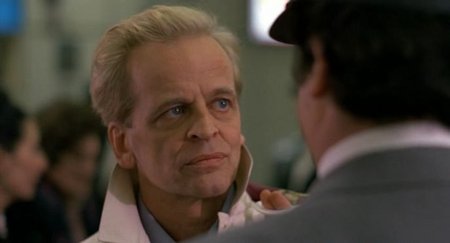
This plot setup takes thirty minutes to get all its pieces put into place, which is a bit long for a movie that essentially boils down to Klaus Kinski and Oliver Reed versus a killer snake. Thankfully, Haggard and screenwriter Robert Carrington (working from a novel by Alan Scholefield) use this extra time to slip in smart and funny bits of character building like Louise seducing both Dave and Jacmel in anticipation of needing to play them against each other, Jacmel’s disgust with Dave when he meets him by complaining that his hands sweat, and understanding why Philip feels the need to have a pet snake in the first place by listening to stories of his grandfather’s safaris in comparison to the overbearing protectiveness of his mother.
Even when the siege proper has begun, Carrington’s script continues to pile on twists and peripheral characters that are entertaining enough, but never provide much to move the film forward. But while Haggard successfully keeps the various spinning plates in the air of Bulloch’s investigation/negotiation with Jacmel, Philip’s increasingly severe asthma attacks, and the ever-present threat of a black mamba bite, the film actually turns on Jacmel’s interactions with Bulloch and Dave.
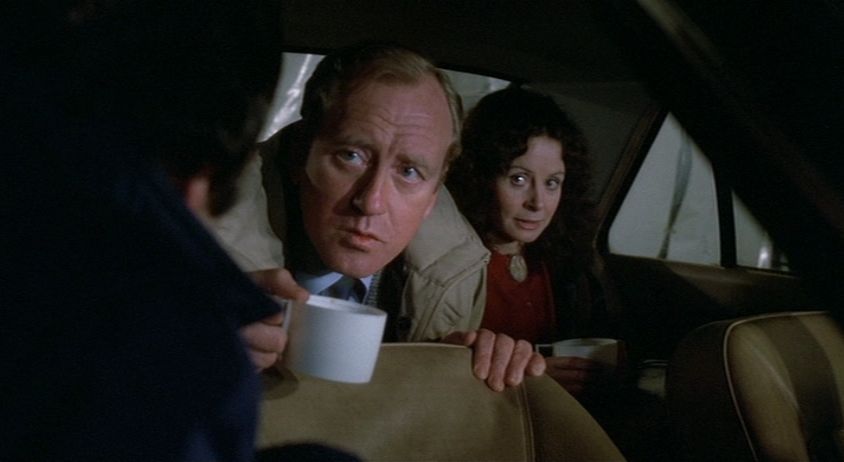
VENOM avoids the cliché of the police negotiator and the criminal developing a grudging respect for each other. Bulloch never likes Jacmel and shows growing disgust as it becomes more and more probable that the ransom will have to be paid to get the hostages released. Jacmel takes a little too much glee in successfully tricking Bulloch by snagging another hostage in the person of Dr. Stowe (Sarah Miles), the toxicologist who reported the snake mix up in the first place. But even though the characters are never in the same room, Haggard and Carrington have fun with their dialogue, spoken back and forth through an open window. Both men repeatedly begin conversations with the line, “Can you hear me?” before delivering a dose of bad news to the other. It becomes a bit of running dark comedy that is only heightened by Kinski’s thick German accent, exaggerated sneer, and his insistence on calling Bulloch “policeman” instead of by his name. Williamson, to his credit, recognizes that he is essentially playing straight man to Kinski’s over-the-top performance and maintains a rock solid demeanor of grouchiness from the second he appears on screen. The interplay of those two performances adds some welcome deadpan humor to the film.
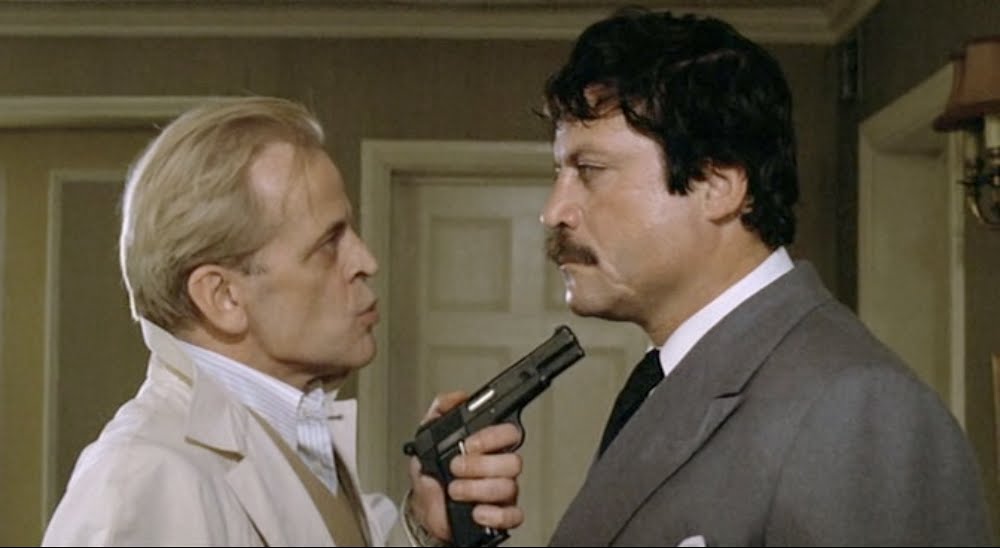
Even better is the seething hatred between Jacmel and Dave. While the script sets them up as rivals for Louise’s affections and makes obvious Jacmel’s disdain for Dave’s amateur criminal, it is clear that the tension between the two stems mostly from the fact that Kinski and Reed seem to honestly hate each other. Both actors were strong screen presences and pulled out occasionally great performances, but they were more forces of nature than great actors. It is hard to believe that their palpable disgust/hatred of the other was born purely of performance. I began to wonder how much the scenes of Dave wanting to always get a drink and Jacmel being right there to stop him were scripted and how much they were improvised around Reed’s legendary thirst for booze and Kinski’s delight in depriving him of his drink.
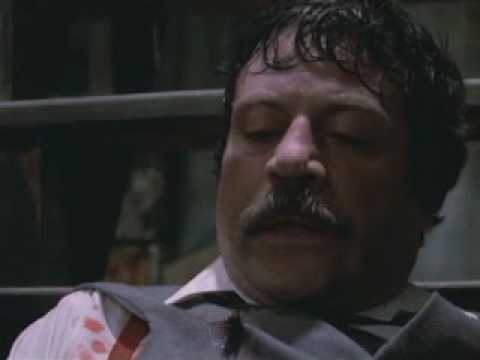
If the sweat that literally pours down Reed’s face throughout the film is any indication, he was actually going through alcohol withdrawal during his scenes. But while Reed simply looks like he badly needs a drink, Hayden at times appears to be at death’s door (VENOM was his final film; he passed away of cancer a few years later). Despite his sonorous voice being intact and a lion-in-winter look with wild, unkempt hair and a bushy beard, Hayden only seems halfway engaged in the film. He does come to life in his scenes with Holcomb when he gets to play the part of the jovial or protective grandparent. But seeing such a towering figure in film history look so frail and disinterested is the only point at which the film loses its sense of trashy fun.
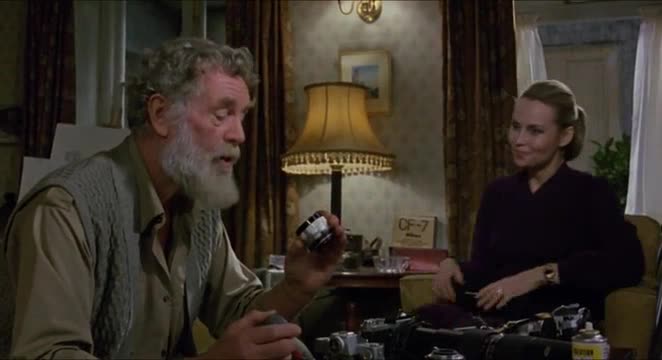
Despite the overabundance of characters and a primary focus on the hostage/siege part of the film, Haggard does get a lot of creepy mileage out of the snake. Deftly combining footage of an actual snake with the rubber variety for certain stunts, the film takes advantage of the innate fear that so many people have (including me) of even the harmless variety of the species. Simply watching the snake as it slithers through heating ducts and disappears around corners is an unnerving experience. I found myself squirming as I kept glancing around the frame for any indication that the snake was going to slither from the darkness or out from under a piece of furniture.
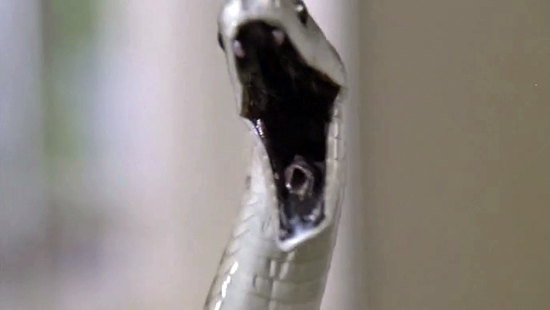
It helps that VENOM layers on the hype for the black mamba as some kind of super-snake. In one scene, Dr. Stowe describes the deadly venom, extraordinary physical abilities, and psychology of the black mamba with such hyperbole that she sounded like a Russian mobster describing the extreme level of badass that is JOHN WICK. Even sillier than her monologue is what the plot has the snake accomplish. The film does not hold up to close examination of how or why the mamba goes where it does, but it does not matter. All that does matter is that the mamba pops up at the most unexpected of moments, ready to scare the hell out of anyone in the audience who has a fear of slithery reptiles.
Despite the mostly good performances, a robust Michael Kamen score, and some honest wit dropped into throwaway dialogue, VENOM is still a trashy snakesploitation movie at heart. It is at its best when it drops the pretense of being something more than a very good entry in that peculiar subgenre and commits to such ridiculous moments as having the mamba slither up a man’s pant leg and bite him in the crotch. Take that recommendation in the spirit in which it is made.
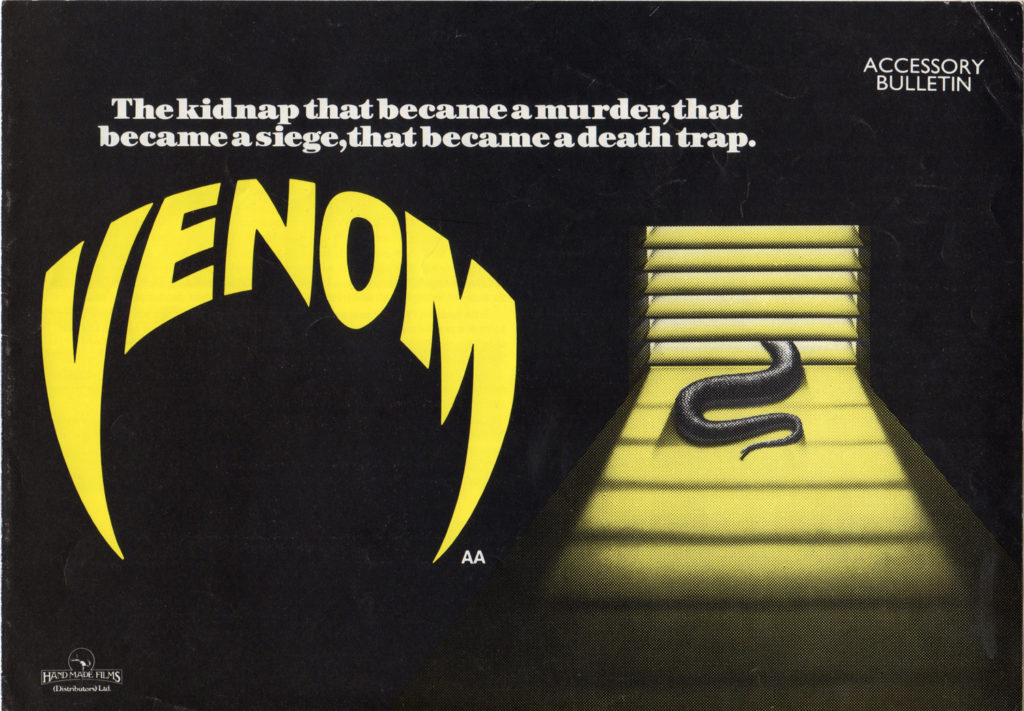
Tags: Cornelia Sharpe, Horror, Klaus Kinski, Lance Holcomb, Martin Bregman, Michael Gough, Michael Kamen, Nicol Williamson, Oliver Reed, Piers Haggard, Sarah Miles, Snakes, Sterling Hayden, Susan George, Tobe Hooper

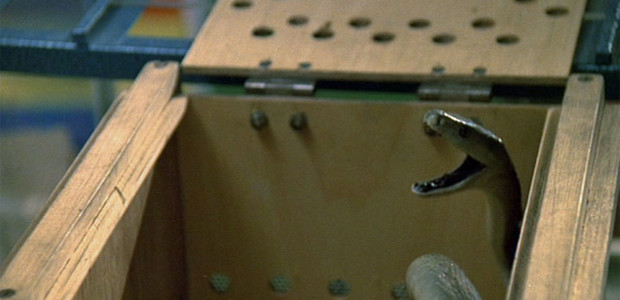
No Comments